Aesthetic porcelain teeth are increasingly loved by many people and are choosing to improve the appearance of their teeth, bringing a more perfect smile. However, there are two main types of porcelain teeth, including metal porcelain teeth and all-ceramic teeth. This makes many customers worried and confused in making decisions. Understanding this concern, My Auris will share information about the two types of porcelain teeth as well as comparison criteria in the following article.
Understand more about metal-ceramic teeth and all-ceramic teeth
Metal-ceramic teeth are what?
Metal ceramic teeth are the first line of porcelain teeth researched and applied in the field of cosmetic porcelain. It can be said that this is the oldest line of porcelain teeth in the porcelain teeth market.
The characteristic feature of metal-ceramic teeth is that the frame is made from metal alloys with components such as nickel-chromium, nickel-cobalt, titanium or precious metals such as gold, silver, platinum, palladium, etc. The outer part of the tooth will be covered with many thin layers of ceramic to help increase aesthetic value and bring a color similar to real teeth.
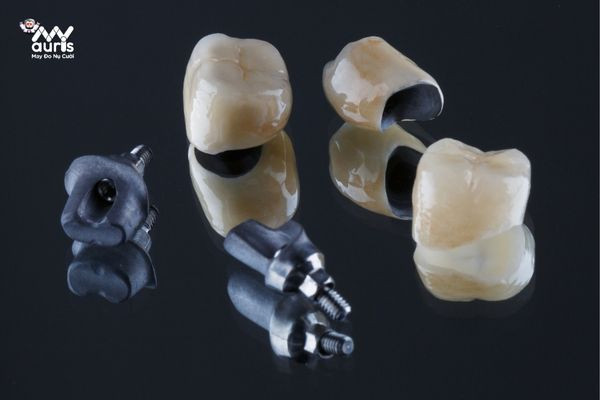
What are all-ceramic teeth?
Thanks to technological developments, all-ceramic teeth were born and are a new generation porcelain line, superior to previous metal-ceramic teeth. All-ceramic teeth are crafted using modern CAD/CAM 3D technology to ensure accuracy in every smallest detail from size, shape to every ridge on the tooth.
At the same time, all-ceramic teeth are made from 100% pure porcelain, not mixed with metal, so the clarity, shine, and color are as natural as real teeth. Besides, porcelain teeth are fired at high temperatures so they are hard and ensure chewing. And pure ceramic material is safe, benign, highly biocompatible, does not cause allergies or irritate the oral environment.
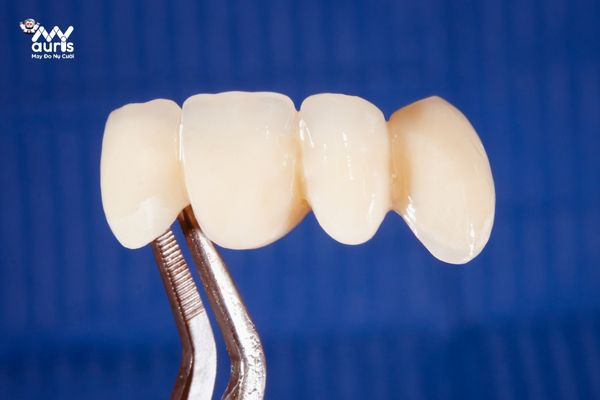
In case of making metal and all-ceramic teeth Porcelain
Both of these two lines of porcelain teeth areDental restorations are used to correct tooth defects:
Yellow, dull teeth
- Dark, dull, yellow or antibiotic-infected teeth
- Tooth is chipped, broken, chipped, no longer intact
- Slightly bucked teeth, underbite, etc.
- Slightly spaced or gapped teeth
- Tooth decay, pulpitis and enamel erosion
- Teeth are in bad shape: crowns are too short or too small, teeth are uneven,…
- Porcelain dental bridge to restore missing teeth
- Ceramic restoration on implant abutment
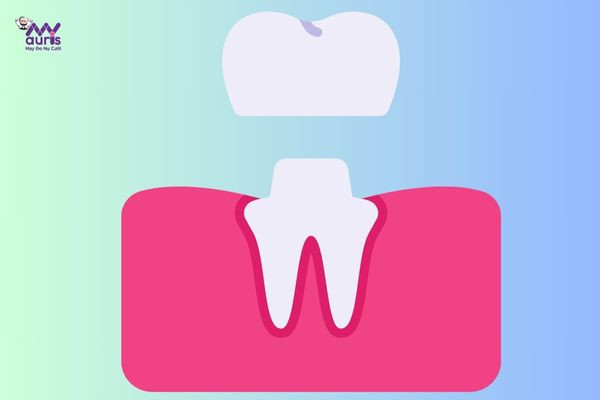
Comparison of metal-ceramic teeth and all-ceramic teeth Porcelain
Although both types of porcelain teeth are used to correct defects in teeth, there are differences in structure, materials, advantages and disadvantages.
Here are some points comparing the differences between metal-ceramic and all-ceramic teeth:
| Comparison factors | Metal ceramic teeth type | All-ceramic teeth | |
| Structure | 2-part structure: metal frame and outer ceramic coating | All teeth are made from 100% pure porcelain. At the same time, porcelain teeth are not bright white and easily show black edges when light shines on them. This makes it easier for people to see dentures. | Natural color, clarity, brightness, whiteness and veins similar to real teeth. Furthermore, porcelain teeth are crafted with modern precision and meticulous attention to detail. Therefore, high aesthetics make it difficult to recognize dentures. |
| Oxidization ability | Because the frame is made of metal, oxidation occurs, causing blacknessgum line after 2-3 years of use. The blackness of the gum line not only causes unsightliness but also causes bad breath. | Because the structure of all-ceramic teeth is 100 pure porcelain, oxidation does not occur. less ability to withstand chewing force due to heterogeneous structure | All-ceramic teeth are fired at high temperatures, so porcelain teeth are strong, able to withstand chewing force many times greater than real teeth |
| durable | Average 3-5 years of use | Average 15-20 years, even forever if you choose quality porcelain, use correct restoration techniques and have proper hygiene and diet. | |
| Properties | Contains metal components so it can cause allergies and irritation of the oral cavity environment, especially for people with sensitive skin. | There are no metal components so it is safe, benign and does not cause allergies to the oral cavity environment. Furthermore, the all-ceramic tooth surface is smooth, smooth, and effectively prevents adhesion. |
Through comparison, it can be seen that all-ceramic teeth have superior advantages over metal porcelain in both aesthetics and function. However, the cost of making all-ceramic teeth will be much higher than metal-ceramic teeth.
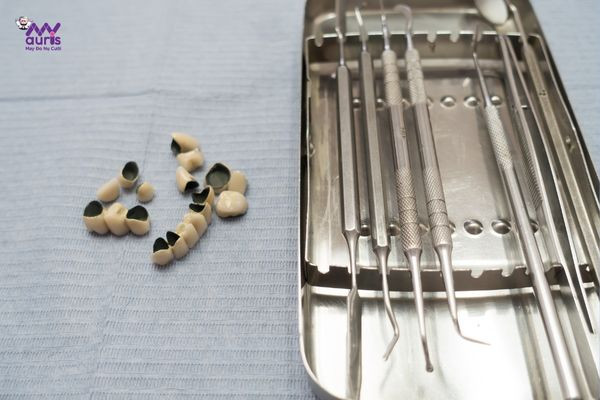
Should I choose metal-ceramic teeth or all-ceramic teeth?
Both metal-ceramic and all-ceramic teeth have distinct advantages and disadvantages. Choosing which porcelain teeth depends on your preferences, needs, financial conditions and oral health status.
According to doctors, choosing all-ceramic teeth will provide longer-lasting restoration results than metal-ceramic teeth. However, if due to financial conditions, customers can choose to restore all-ceramic teeth on the outside and metal-ceramic teeth on the inside teeth so as not to affect aesthetics.

How to care for and prolong the life of porcelain teeth
Whether it’s metal-ceramic tooth restoration or All porcelain, to prolong the life of teeth, everyone needs to have proper oral care and hygiene:
- Maintain hygiene habits: Brush your teeth at least twice a day with a soft, moderate toothbrush Besides brushing teeth, it is necessary to combine the use of dental floss, water floss, salt water, and mouthwash to clean between teeth, places that the brush cannot reach.
- Diet: Build a scientific diet, full of nutrition, with a variety of foods. Prioritize the addition of fruits and vegetables to increase the ability to clean the cavity At the same time, you should limit foods high in sugar, starch, and acids that are difficult to clean.
- Limit dark foods such as tea, coffee, cocoa, etc. Because dark colors can quickly change the color of porcelain teeth.
- Abstain from smoking because the nicotine in cigarettes is the “destroyer” of porcelain teeth. It not only causes porcelain teeth to discolor but also deteriorates quickly.
- Limit tooth grinding because porcelain teeth can break, chip, or crack. If you can’t fix it, you can talk to your doctor about using a suitable anti-bruxism tray.
- Regularly check and monitor your dental health and the quality of your porcelain teeth. aria-describedby=”caption-attachment-46682″ style=”width: 600px” class=”wp-caption aligncenter”>
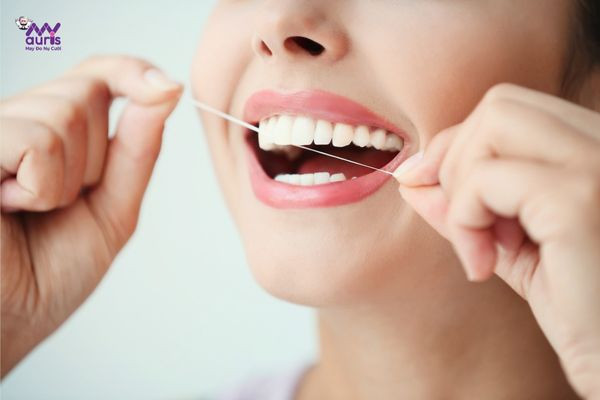
How to care for and prolong the life of porcelain teeth Hope everyone will understand more about these porcelain teeth products. From there, consider and choose suitable porcelain teeth for restoration, bringing aesthetic results To choose the right porcelain teeth, please contactMy Auris dentistry to listen to the consultation and schedule an examination as soon as possible. relative”>





